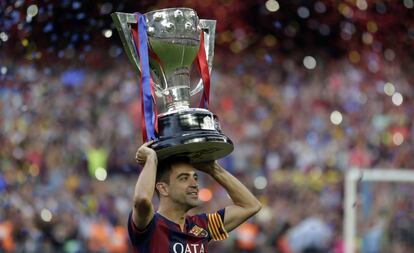Xavi’s Plan B
The former player has the great qualities needed to be a special manager: knowledge, passion, charisma and that conciliatory sprit that forges a team

They call it the black hole. That overwhelming vertigo that ensnares you when you see the end of your days as a soccer player approaching, and all of a sudden you have to slam the brakes on your non-stop routine of training, travel, matches and recovery. Your life is like a merry-go-round, one that sets out your path for you, and when it stops, you don’t want to get off. You don’t know which way to turn.
I found it very difficult to decide which direction to take in the future, and I put off my retirement until the age of 36
My father created the Cruyff Institute because he was convinced that soccer players needed a Plan B. He didn’t finish school and, as such, he was even more aware that a serious injury or a health problem could easily leave a player in the lurch. In my case, he insisted that I make more of an effort with my studies than on my emerging career as a soccer player, even punishing me with no training sessions should I flunk a class. I studied Administration and Business Management in Barcelona, and postgraduate studies in Marketing in Manchester, but I found it very difficult to decide which direction to take in the future, and I put off my retirement until the age of 36, when I had a rough idea of what I wanted to do. I opted to go in the sporting direction and, years later, I caught the bug of wanting to go into management in order to get to know the other side of the sport.
In the case of Xavi Hernández, everyone assumed that his plan B would involve, sooner or later, going into management. But I am sure that he spent a lot of time considering the right moment to hang up his boots and make the jump to the bench. He has always been a guy with clear ideas. A special player who, along with Leo Messi and Andrés Iniesta, showed us that this sport is played with your head, banishing the traditional way of thinking that you need to be tall, strong and fast to function on the pitch.
A lot of people assume that his extraordinary vision of the game as a player would automatically turn him into a great strategist from the technical area. And that the genetic fingerprint of La Masia school would turn him into a candidate to manage Barça in the future. There’s plenty of pressure on him already, but I am sure that he is aware that not all good soccer players end up being good managers. One thing is what you have in your head, and another thing is knowing how to transmit it and explain it. Many managers who were once great footballers find it very difficult to adapt to players whose skills are below their own level and see the game through a much more limited prism. That will be their biggest challenge: simplifying concepts and slowing down their own brains, which run at 300 kilometers an hour.
Many managers who were once great footballers find it very difficult to adapt to players whose skills are below their own level
Being a manager is also a team job. You need assistants who dominate areas that you don’t, and without fear of disagreeing with you, complete you. Coaches who like talking about soccer, as is Xavi’s case, like to surround themselves with people who have their own opinions, extra pairs of eyes that offer support, and more hands on deck to help maintain a connection with a squad that has multiple personalities. When he was Sir Alex Ferguson’s number two, Steve McClaren was a great motivator in terms of training on the pitch, and prompted me to practice on a daily basis with a lot more enthusiasm, despite being a substitute. I didn’t hesitate to invite him to form part of my technical team, there to advise me when I moved from being sports director to manager of Maccabi Tel Aviv.
Xavi has great qualities to be a special manager: he has knowledge, passion, charisma and that conciliatory spirit that forges a team. When there was a serious risk of a rift between Barça and Real Madrid players on the Spanish national team, Xavi set an example of common sense, along with Iker Casillas. It’s a coincidence that the future of both of those men has been in the news this week for different reasons. The heart of Casillas, which fortunately is on the road to recovery, and the head of Xavi, have reminded us that we are approaching the horizon of a golden age in Spanish soccer. And the two of them still have a lot to show us.
English version by Simon Hunter.
Tu suscripción se está usando en otro dispositivo
¿Quieres añadir otro usuario a tu suscripción?
Si continúas leyendo en este dispositivo, no se podrá leer en el otro.
FlechaTu suscripción se está usando en otro dispositivo y solo puedes acceder a EL PAÍS desde un dispositivo a la vez.
Si quieres compartir tu cuenta, cambia tu suscripción a la modalidad Premium, así podrás añadir otro usuario. Cada uno accederá con su propia cuenta de email, lo que os permitirá personalizar vuestra experiencia en EL PAÍS.
¿Tienes una suscripción de empresa? Accede aquí para contratar más cuentas.
En el caso de no saber quién está usando tu cuenta, te recomendamos cambiar tu contraseña aquí.
Si decides continuar compartiendo tu cuenta, este mensaje se mostrará en tu dispositivo y en el de la otra persona que está usando tu cuenta de forma indefinida, afectando a tu experiencia de lectura. Puedes consultar aquí los términos y condiciones de la suscripción digital.









































